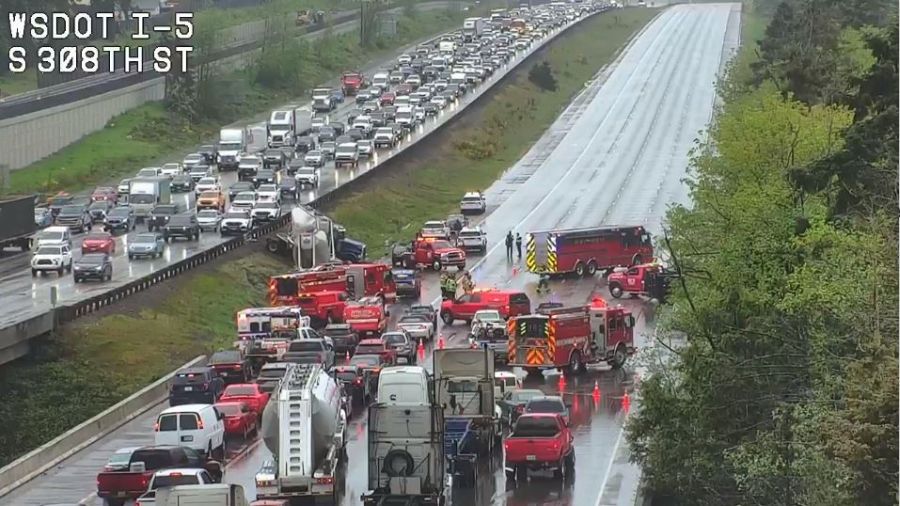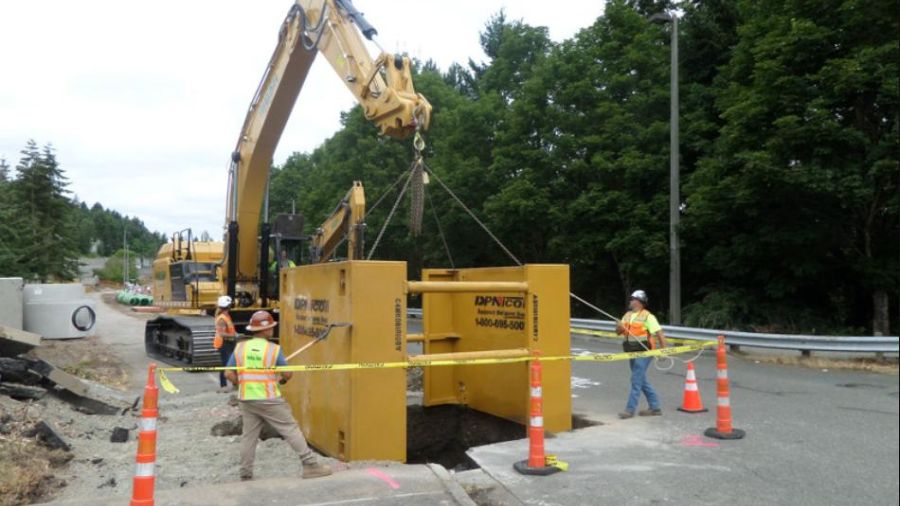28 mayors don’t want shorter drug sentences proposed in House bill
Apr 21, 2023, 9:58 AM

Drugs, cash, and guns, including three kilos of cocaine, were recovered from bust. (Photo courtesy of the Seattle Police Department)
(Photo courtesy of the Seattle Police Department)
With a recently passed House bill changing drug laws in Washington state, 28 mayors wrote a letter to state legislators in Olympia saying that they supported the Senate’s bill rather than the changes made in the House.
The mayors say that the current drug laws are not strong enough to protect their towns from public drug use and the House’s amendments would make these laws even weaker.
State Legislature battles over criminalizing drug possession
The House’s amendments to the bill, SB 5536, would make drug possession a misdemeanor instead of a gross misdemeanor. A gross misdemeanor carries a sentence of up to 364 days in jail and a $5,000 fine, while the maximum sentence for a misdemeanor is only 90 days in jail and up to a $1,000 fine.
The letter signed by the mayors was sent to the state legislature to say that the bill would make it more difficult for cities to deal with public drug use and that the Senate’s version of the legislation is preferable.
The mayors are from Spokane, Spokane Valley, Cheney, Liberty Lake, Medical Lake, Millwood, Colville, Chewelah, Colfax, Pasco, Richland, Everett, Marysville, Lake Stevens, Sultan, Kent, Renton, Auburn, Lakewood, Puyallup, Gig Harbor, Orting, Milton, Ruston, Sumner, Bonney Lake, Kennewick, and Yakima.
“As local governments, public safety is our number one job, and we are asking for help from the state Legislature to restore tough boundaries, maintain local control, and protect our communities,” the letter reads. “We, the undersigned mayors, have become increasingly concerned with the changes made by the House to SB 5536. The changes represent a step back in accountability and make it more difficult for local governments to keep our communities safe.”
It also asserts that the bill would make it harder to get people into treatment, saying that those with a substance abuse disorder are unable to recognize the need to get help and that harsher penalties for drug possession are the only way to get people into treatment.
The mayors say the version of the bill that is being considered doesn’t hold people accountable or compel them to seek out the services they need.
“Though substance use disorder is a medical issue, someone that suffers from substance use disorder does not have the right to victimize the community,” the letter said. “The law that ultimately gets passed out of the legislature needs to contain tougher guardrails so that individuals enter and complete the necessary treatment and services. We are urging that the legislature retain the mandatory minimums and gross misdemeanor penalty in the Senate version for final passage of the bill.”
There also is concern that the bill would restrict how cities deal with public drug use, which has been an issue with several communities across the Puget Sound region.
The bill could also preempt local laws, and the mayors say cities should have the power to address the situations.
“Our communities are tired of the rampant drug use and the resulting violence, vandalism, and crimes that typically accompany substance abuse. We hear about it every single day. Decriminalizing drugs and taking away necessary accountability has sent the wrong message to the small percentage of criminal element that is negatively impacting the overwhelming majority of law-abiding individuals in our communities,” the letter said.
The bill could also preempt local laws, and the mayors say cities should have the power to address the situations.
Because House members amended the bill, it now goes back to the Senate for further consideration. The two chambers have until the State Legislature adjourns April 23 to pass legislation.
The full letter can be read here:
Hello State Legislators,
As local governments, public safety is our number one job, and we are asking for help from the state Legislature to restore tough boundaries, maintain local control, and protect our communities. We, the undersigned mayors, have become increasingly concerned with the changes made by the House to SB 5536. The changes represent a step back in accountability and make it more difficult for local governments to keep our communities safe.
We recognize substance use disorder is a medical issue and that substance use disorder treatment and services are necessary. We appreciate that the Legislature has taken action to approve crisis response facilities and has allocated funding to construct those facilities to ensure that treatment and services are available. However, even with available facilities, substance use disorder impairs individual decision-making ability which prevents many from entering necessary treatment and services without being adequately compelled. Given that, any final version of SB 5536 needs to ensure that the final bill enacted encourages individuals to obtain necessary treatment, holds individuals accountable, and directs the court to implement a mandatory penalty that is often necessary for the individual to enter and complete treatment.
We are supportive of the Senate’s proposal to make possession of controlled substances punishable as a gross misdemeanor and for the additional statutory guidance to the judiciary on appropriate sentencing levels. However, there are specific issues within the House-approved version of SB 5536 that are gravely concerning to local cities who are accountable for and must deal with the local impacts associate with drug use.
• We are concerned that the version passed out of the House lacks adequate accountability to compel an individual to seek and complete the services they need. Though substance use disorder is a medical issue, someone that suffers from substance use disorder does not have the right to victimize the community. The state must recognize that substance use disorder impairs individual decision-making ability and has substantial impact on the individual and the community they live in and that individual requires incentives, which often includes being compelled, to seek help. The law that ultimately gets passed out of the legislature needs to contain tougher guardrails so that individuals enter and complete the necessary treatment and services. We are urging that the legislature retain the mandatory minimums and gross misdemeanor penalty in the Senate version for final passage of the bill.
• We are also concerned with the addition to the legislation language that restricts the ability of local jurisdictions to regulate the public use of drugs. The House insertion into the Senate bill will preempt local laws passed or being considered by many cities across the state. The public use of drugs presents an immediate and prolonged health and safety risk to our local public from the discarded paraphernalia, effects of the drug on the user, and potential contact with the substance by law abiding people. For these reasons cities ought to have the power to address this dangerous situation in a manner that is best to protect their families, visitors, workforce, businesses, and others in their community. We are concerned that current local laws that have proven to be effective at addressing these impacts will be replaced with a state law that will fail to address the local issues. Public use is different than simple possession for these reasons and should be treated as such.
Our communities are tired of the rampant drug use and the resulting violence, vandalism, and crimes that typically accompany substance abuse_ We hear about it every single day. Decriminalizing drugs and taking away necessary accountability has sent the wrong message to the small percentage of criminal element that is negatively impacting the overwhelming majority of law-abiding individuals in our communities.
Our families, businesses, and individuals deserve to live in a community where they feel safe and you can help us get there. Please address the measures outlined above so that we can stand in partnership in the safety of our communities.
Regards,
Nadine Woodward Mayor City of Spokane
Terri Cooper Mayor, City of Medical Lake
Pam Haley Mayor, City of Spokane Valley
Kevin Freeman Mayor, City of Millwood
Chris Grover Mayor, City of Cheney
Cristella Kaminskas Mayor, City of Liberty Lake
Jack Smith Mayor, City of Colville
Gregory McCunen Mayor, City of Chewelah
Jim Retzer Mayor, City of Colfax
Blanche Barajas Mayor, City of Pasco
Terry Christensen Mayor, City of Richland
Cassie Franklin Mayor, City of Everett
Jon Nehring Mayor, City of Marysville
Armando Pavone Mayor, City of Renton
Brett Gailey Mayor, City of Lake Stevens
Nancy Backus Mayor, City of Auburn
Tracie Markley Mayor, City of Gig Harbor
Josh Penner Mayor, City of Orting
Kathy Hayden Mayor, City of Sumner
Michael McCullough Mayor, City of Bonney Lake
Russell Wiita Mayor, City of Sultan
Jason Whalen Mayor, City of Lakewood
Shanna Styron Sherell Mayor, City of Milton
Bill McKay Mayor, City of Kennewick
Dana Ralph Mayor, City of Kent
Dean Johnson Mayor, City of Puyallup
Bruce Hopkins Mayor, City of Ruston
Janice Deccio Mayor, City of Yakima













